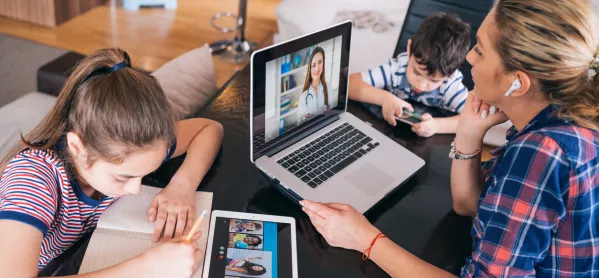The government’s free laptops scheme has been “hugely successful”, the Department for Education official leading on digital learning plans said today.
Appearing before the All-Party Parliamentary Group (APPG) on Education Technology this afternoon, Katherine Moulds, the DfE’s deputy director in charge of the digital strategy for education, reflected positively on the programme to supply laptops and tablets to pupils in need during the Covid crisis.
She also hinted at further efforts to boost the availability of technology, revealing that the department is “looking at a future strategy on possible access to devices as part of the comprehensive spending review”.
Related: DfE finally hits target on laptops for disadvantaged
Devices: Schools back a week and the DfE laptop target is still not met
Online learning: Schools ‘find malware’ on DfE laptops
Asked what will happen when the 1.3 million devices supplied by the department “age out”, and about the “commitment to funding”, Ms Moulds said: “The department is investing now, actually, in levelling up technology infrastructure across the country, and we’re working also across government on connectivity - particularly with DCMS [the Department for Culture, Media and Sport], obviously.
Delays in the DfE free laptops scheme
“On the devices programme, it’s been hugely successful - devices have been provided to schools and local authorities.”
She added: “We are looking at a future strategy on possible access to devices as part of the comprehensive spending review, but we really do need to think about the best and the most sustainable use of our investment in technology.”
Earlier this month, the government finally fulfilled its pledge to provide 1.3 million laptops and tablets to pupils in need across the country.
But the journey to this point has not been smooth sailing.
Ten days after the scheme was announced on 19 April last year, education secretary Gavin Williamson said the laptops wouldn’t begin to arrive until the end of May, with the majority being delivered in June.
On 9 June, Meg Hillier, Labour chair of the Commons Public Accounts Committee, raised concerns about delays to the programme.
But the education secretary refuted her claims, arguing that the DfE was “on target” to deliver all the devices by the end of the month.
By 14 June, just over half of the free laptops pledged by the department had yet to be delivered.
Meanwhile, headteachers complained that the free laptops for disadvantaged pupils were arriving at schools “locked” and unusable.
The DfE went on to miss the education secretary’s delivery target by nearly 30,000.
In July, Tes revealed that the government allocated at least 4,000 fewer free laptops and tablets than councils said they needed.
And in the week before pupils were due to go back to school in September, the DfE had still yet to meet the target it set to deliver 230,000 laptops to local authorities and academy trusts by the end of June.
More devices were then pledged in stages by the DfE for the autumn term, earmarked for disadvantaged children required to stay at home due to Covid.
But the extended scheme also proved controversial when the department cut schools’ laptop allocations just a day after they were given a legal duty to ensure that pupils had instant access to remote education.
At the beginning of this year, concerns were also raised that schools had discovered malware on their government-funded laptops that was said to appear to be contacting Russian servers.
The DfE went on to increase the number of devices pledged to a final total of 1.3 million in January.
As of 6 May, 1,313,449 laptops and tablets had been delivered or dispatched to pupils in need.





